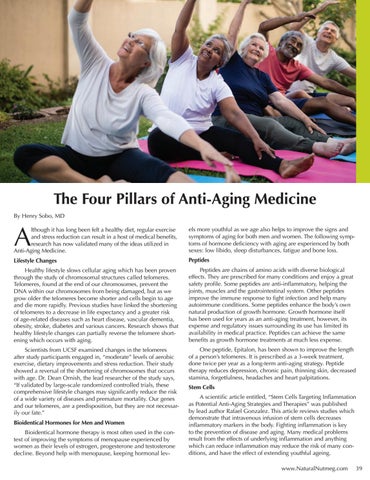The Four Pillars of Anti-Aging Medicine By Henry Sobo, MD lthough it has long been felt a healthy diet, regular exercise and stress reduction can result in a host of medical benefits, research has now validated many of the ideas utilized in Anti-Aging Medicine.
A
els more youthful as we age also helps to improve the signs and symptoms of aging for both men and women. The following symptoms of hormone deficiency with aging are experienced by both sexes: low libido, sleep disturbances, fatigue and bone loss.
Lifestyle Changes
Peptides
Healthy lifestyle slows cellular aging which has been proven through the study of chromosomal structures called telomeres. Telomeres, found at the end of our chromosomes, prevent the DNA within our chromosomes from being damaged, but as we grow older the telomeres become shorter and cells begin to age and die more rapidly. Previous studies have linked the shortening of telomeres to a decrease in life expectancy and a greater risk of age-related diseases such as heart disease, vascular dementia, obesity, stroke, diabetes and various cancers. Research shows that healthy lifestyle changes can partially reverse the telomere shortening which occurs with aging.
Peptides are chains of amino acids with diverse biological effects. They are prescribed for many conditions and enjoy a great safety profile. Some peptides are anti-inflammatory, helping the joints, muscles and the gastrointestinal system. Other peptides improve the immune response to fight infection and help many autoimmune conditions. Some peptides enhance the body’s own natural production of growth hormone. Growth hormone itself has been used for years as an anti-aging treatment, however, its expense and regulatory issues surrounding its use has limited its availability in medical practice. Peptides can achieve the same benefits as growth hormone treatments at much less expense.
Scientists from UCSF examined changes in the telomeres after study participants engaged in, “moderate” levels of aerobic exercise, dietary improvements and stress reduction. Their study showed a reversal of the shortening of chromosomes that occurs with age. Dr. Dean Ornish, the lead researcher of the study says, “If validated by large-scale randomized controlled trials, these comprehensive lifestyle changes may significantly reduce the risk of a wide variety of diseases and premature mortality. Our genes and our telomeres, are a predisposition, but they are not necessarily our fate.”
One peptide, Epitalon, has been shown to improve the length of a person’s telomeres. It is prescribed as a 3-week treatment, done twice per year as a long-term anti-aging strategy. Peptide therapy reduces depression, chronic pain, thinning skin, decreased stamina, forgetfulness, headaches and heart palpitations.
Bioidentical Hormones for Men and Women Bioidentical hormone therapy is most often used in the context of improving the symptoms of menopause experienced by women as their levels of estrogen, progesterone and testosterone decline. Beyond help with menopause, keeping hormonal lev-
Stem Cells A scientific article entitled, “Stem Cells Targeting Inflammation as Potential Anti-Aging Strategies and Therapies” was published by lead author Rafael Gonzalez. This article reviews studies which demonstrate that intravenous infusion of stem cells decreases inflammatory markers in the body. Fighting inflammation is key to the prevention of disease and aging. Many medical problems result from the effects of underlying inflammation and anything which can reduce inflammation may reduce the risk of many conditions, and have the effect of extending youthful ageing. www.NaturalNutmeg.com
39






















